更多关于威廉姆斯的伦理知识和反思
IF 1.3
2区 哲学
0 PHILOSOPHY
引用次数: 0
摘要
摘要:伯纳德·威廉姆斯在《伦理学与哲学的极限》一书中提出,在伦理学中,反思可以摧毁知识。我试图为这一论点辩护,以免受到不连贯的指责。我之所以这样做,是因为我严肃地认为,伦理知识就是从伦理角度出发的知识。然而,关于这一论点是否与威廉姆斯自己作品中的其他观点一致,特别是他对笛卡尔的知识的看法,仍然存在一个问题。在之前的一篇文章中,我认为它不是。在随后的一篇文章中,我表示我已经改变了主意,并对威廉姆斯的论点给出了更有同情心的描述。在这篇文章中,我列出了这些问题,并说了一些关于我的想法的变化。本文章由计算机程序翻译,如有差异,请以英文原文为准。
More on Williams on Ethical Knowledge and Reflection
Abstract This essay is concerned with Bernard Williams’ contention in Ethics and the Limits of Philosophy that, in ethics, reflection can destroy knowledge. I attempt to defend this contention from the charge of incoherence. I do this by taking seriously the idea that ethical knowledge is knowledge from an ethical point of view. There nevertheless remains an issue about whether the contention is consistent with ideas elsewhere in Williams’ own work, in particular with what he says about knowledge in Descartes . In an earlier essay I argued that it is not. In a subsequent essay I indicated that I had changed my mind and gave a more sympathetic account of Williams’ contention. In this essay I set out the issues and say some more about my change of mind.
求助全文
通过发布文献求助,成功后即可免费获取论文全文。
去求助
来源期刊

TOPOI-AN INTERNATIONAL REVIEW OF PHILOSOPHY
PHILOSOPHY-
CiteScore
3.10
自引率
7.10%
发文量
47
期刊介绍:
Topoi''s main assumption is that philosophy is a lively, provocative, delightful activity, which constantly challenges our received views, relentlessly questions our inherited habits, painstakingly elaborates on how things could be different, in other stories, in counterfactual situations, in alternative possible worlds. Whatever its ideology, whether with the intent of uncovering a truer structure of reality or of soothing our anxiety, of exposing myths or of following them through, the outcome of philosophical activity is always the destabilizing, unsettling generation of doubts, of objections, of criticisms. It follows that this activity is intrinsically a ''dialogue'', that philosophy is first and foremost philosophical discussion, that it requires bringing out conflicting points of view, paying careful, sympathetic attention to their structure, and using this dialectic to articulate one''s approach, to make it richer, more thoughtful, more open to variation and play. And it follows that the spirit which one brings to this activity must be one of tolerance, of always suspecting one''s own blindness and consequently looking with unbiased eye in every corner, without fearing to pass a (fallible) judgment on what is there but also without failing to show interest and respect. Topoi''s structure is a direct expression of this view. To maximize discussion, we devote most or all of this issue to a single topic. And, since discussion is only interesting when it is conducted seriously and responsibly, we usually request the collaboration of a guest-editor, an expert who will identify contributors and interact with them in a constructive way. Because we do not feel tied to any definite philosophical theme (or set of them), we choose the topic with absolute freedom, looking for what is blossoming and thriving, occasionally betting on what might - partly through our attention - ''begin'' to blossom and thrive. And because we do not want our structur e to become our own straightjacket, we are open to contributions not fitting the ''topos'', and do not rule out in principle the possibility of topic-less issues.
 求助内容:
求助内容: 应助结果提醒方式:
应助结果提醒方式:


